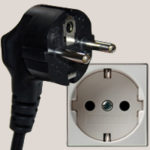Know before you go
Germany
General Information
Germany is located in Central Europe and bordered by 9 countries: France, Luxemburg, Belgium, the Netherlands, Denmark, Poland, the Czech Republic, Austria and Switzerland. Its capital and largest city is Berlin. Germany is both member of the European Union and the Schengen Agreement. They drive on the left side of the road.
Visa
Holders of a EU passport don’t require a Visa. For holders of a different passport check out this link to see if you are required to apply for a visa or not or contact your ministery of foreign affairs.
Watch Geography Now!
The video will give you a good first overview of Germany.

Power
Germany uses Type F plug outlets („Schuko“). They also work with Type C and E. The voltage is 230 Volt and the frequency is 50 Hz.
Language
No surprise, the official language in Germany is German. It’s easy to get by with English though.
| German | English |
|---|---|
| Hallo! | Hello! |
| Tschüs! | Bye! |
| ja | yes |
| nein | no |
| Danke! | Thank you! |
| Bitte! | You're welcome! |
| Entschuldigung! | Excuse me! |
| Prost! | Cheers! |
Weather Forecast
Climate
Most of Germany has a temperate seasonal climate dominated by humid westerly winds. The country is situated in between the oceanic Western European and the continental Eastern European climate. Winters are cool and summers tend to be warm: temperatures can exceed 30 °C (86 °F). There is no consistent dry season.
Average Temperature in Berlin
Average Precipitation in Berlin
Transportation
How to get there?
The busiest airports in Germany are Frankfurt (FRA) and Munich (MUC), though many more are well served by international airlines. Here you find a list of all airports in Germany. It might be worth flying in and out of Germany using different airports due to the size of the country. Germany is also well connected via international train and bus services.
How to get around?
Germany has a good public transportation infrastructure. There are trains, busses and trams. Berlin, Hamburg, Munich and Nuremberg also have a Metro. Public transport is even available in smaller towns and villages, however, the frequency will be lower. Most larger cities also have a good infrastructure of bike lanes making it easy to explore the city on two wheels.
Money, Money, Money

Currency
Germany is part of the Eurozone and therefore uses the Euro as its currency. Check out the currency converter to find out about current exchange rates.
Accommodation
Depending on where you are staying prices will vary of course. Expect to be paying around 35€ per person per night.
Cash
Even though credit cards are widely accepted, you should still withdraw Euros at an ATM. Cash is still king in many places like restaurants, markets and small shops. How much you will need of course depends on your spending habits. Expect to need around 40€ per day for food, transportation, activities and souvenirs.


